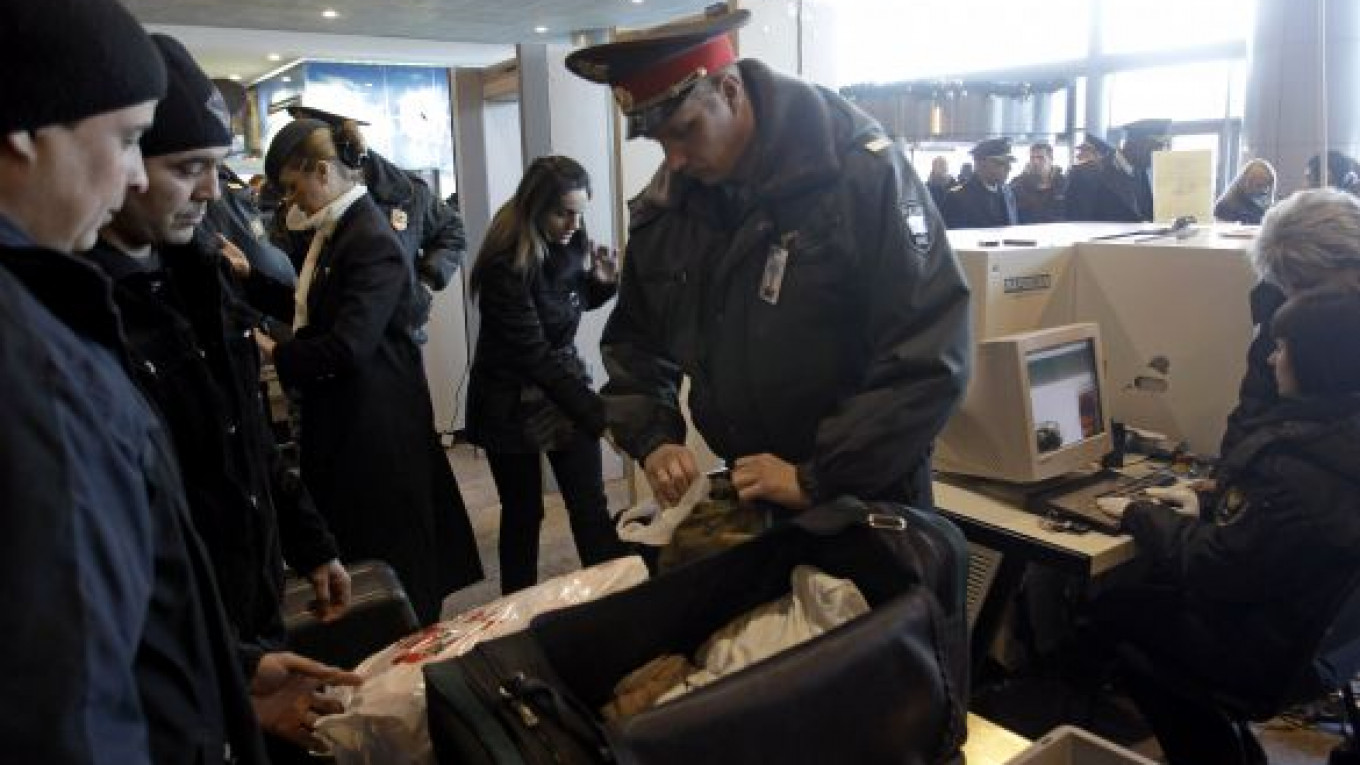The suicide bombing in the arrivals hall of Domodedovo Airport suggests that Islamist militants have a new target — the Kremlin’s bid to attract foreign investors.
Monday’s attack ripped through crowds at Domodedovo, the country’s busiest airport, just two days before President Dmitry Medvedev pitched Russia to the world’s business elite at Davos.
“On the eve of Davos, the attack appears designed to undermine Russia’s objective of becoming an international financial and cultural center,” the director of consultancy Eurasia Group, Cliff Kupchan, said in a note to clients.
After delaying his arrival, Medvedev still spoke at the investor forum in Switzerland on Wednesday.
But the assault on Russia’s main port of entry looks calculated to thwart his message. Foreigners were among the 35 dead and more than 110 wounded.
“The terror attack will surely be a prominent topic at Davos, and some investors will wonder anew about Russia’s safety,” Kupchan said. “If the bombing did result from indigenous terror, this attack will cause reputational damage beyond the tragic loss of life.”
No one has yet claimed responsibility for the bombing.
Medvedev, who was propelled into the Kremlin’s top job in 2008 by his mentor, Prime Minister Vladimir Putin, is leading a drive to present Russia as a lucrative $1.4 trillion economy that is recovering from crisis and open for foreign investment.
Moscow has lured big names such as British oil major BP and U.S. food and drink giant PepsiCo to make big purchases in Russia over the past two months. More may follow.
But Russian officials had already been fighting an uphill battle to convince investors that endemic corruption, mounds of red tape and patchy rule of law are worth the rewards. Killing and maiming dozens at a major airport makes their jobs harder.
“It will create a perception of danger for Western visitors, as well as being a psychological blow for the Russian population,” said analyst Matthew Clements at IHS Jane’s in London.
Aside from increasing concerns for personal safety among would-be investors, it also raises wider questions about the Kremlin’s ability to run the world’s most extensive country.
Nearly two decades after Chechen separatists first challenged Moscow rule following the collapse of Soviet communism, and tens of thousands of deaths later, the Kremlin’s problems in the mainly Muslim republics of the North Caucasus on Russia’s southern flank are, if anything, increasing.
Poverty and radical Islam have inspired many young people. And no matter how much money the Kremlin pours in, or how many security measures are taken, analysts say the Kremlin has achieved very little. Violence is actually spreading.
Insurgency leader Doku Umarov last year vowed to bring his fight to Russia’s heartland and to hit the energy and transport infrastructure that pumps the lifeblood of Russia’s economy.
Until now, the rebels focused on primarily domestic targets such as the Moscow metro — where suicide bombers struck in March killing 40 people — intercity trains and power stations. The airport bomber may demonstrate a shift in that focus.
“Airports are frequented by international personnel … so the psychological impact of this attack is far greater than a selective attack on a specific sector of society,” said Samantha Wolreich, a senior risk consultant with AKE Intelligence.
Putin has trumpeted Russia’s winning the rights to host the 2014 Winter Olympics and the football World Cup in 2018.
But security is a concern, especially as Sochi is in the North Caucasus and many rebels consider it “occupied territory.”
Jane’s Clements said the airport attack meant government claims to have already “pacified” the North Caucasus rebellion sound hollow: “Not only is Moscow unable to contain the violence,” he said. “It also can’t prevent it from spreading.”
A Message from The Moscow Times:
Dear readers,
We are facing unprecedented challenges. Russia's Prosecutor General's Office has designated The Moscow Times as an "undesirable" organization, criminalizing our work and putting our staff at risk of prosecution. This follows our earlier unjust labeling as a "foreign agent."
These actions are direct attempts to silence independent journalism in Russia. The authorities claim our work "discredits the decisions of the Russian leadership." We see things differently: we strive to provide accurate, unbiased reporting on Russia.
We, the journalists of The Moscow Times, refuse to be silenced. But to continue our work, we need your help.
Your support, no matter how small, makes a world of difference. If you can, please support us monthly starting from just $2. It's quick to set up, and every contribution makes a significant impact.
By supporting The Moscow Times, you're defending open, independent journalism in the face of repression. Thank you for standing with us.
Remind me later.






